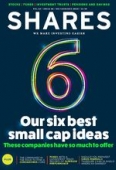Archived article
Please note that tax, investment, pension and ISA rules can change and the information and any views contained in this article may now be inaccurate.
Guess how many ETFs have beaten Fundsmith since it launched?

Since its inception in November 2010 Terry Smith’s Fundsmith Equity Fund (B41YBW7) has been one of the fund management industry’s big success stories. It has achieved a return of 386.4% and has attracted so much money from investors that it now commands more than £18bn of assets under management.
We’re often told fund managers don’t justify their extra cost as so few of them outperform the market. With this in mind Shares decided it to see just how many exchange-traded funds (ETFs), most of which simply track a market and often charge lower fees, have outperformed Fundsmith since it was launched.
A VERY SMALL LIST
The short answer is very few. Out of all the exchange-traded funds available to buy on the London Stock Exchange, only four have done better than Fundsmith over that time according to data from FE Fundinfo.
Two of these ETFs – Amundi ETF Leveraged MSCI USA Daily (0WAX) and Xtrackers S&P 500 2x Leveraged Daily Swap (XS2D) – offer leveraged exposure to the US market.
Leveraged ETFs seek to amplify the movement of an index through the use of swaps, futures contracts and borrowed money. Typically the borrowing cost is deducted from the daily return and is either incorporated into the index or in the calculation of the product’s price.
That may sound very confusing if you’re not familiar with terminology used in investing. In a nutshell, a 2x leveraged product will go up twice as much as the underlying index moves. It will also fall by twice as much as the decline in the index. For that reason, we believe leveraged ETFs are not suitable for the majority of retail investors. They are very high risk and you risk losing money fast.
Apart from the boost from being leveraged products, how did those two ETFs beat Fundsmith? It’s essentially down to US stocks having reached new record highs and enjoying a very strong run in the last decade, supported by favourable central bank policies and the recovery from the financial crisis. The two ETFs tracked the thriving US market and got an extra boost from being leveraged.
A big feature of the impressive showing for US stocks has been the performance of big technology firms like Apple, Microsoft, Facebook, Twitter and Alphabet (Google). So it’s little surprise to see that the two more mainstream ETFs which have also beaten Fundsmith track the Nasdaq 100 index in the US – Amundi Nasdaq 100 (ANXG) and Lyxor Nasdaq 100 (NASL) – which includes the heavyweights from the tech-biased Nasdaq index.
BEATING FUNDSMITH HAS MEANT TAKING A LOT OF RISK
Beating Fundsmith with ETFs would either have meant taking on risks which are not appropriate for the majority of retail investors by using leveraged vehicles, or identifying what was possibly the sweetest of sweet spots in global markets over the last decade.
Notably these products aren’t at the cheaper end of the ETF universe either. While some ETFs have fees as low as 0.06%, one of these funds has ongoing charges of 0.6%. Though this is still less than the 1.05% and 1.55% Fundsmith levies on holders of its T Class and R Class units respectively.
The success story at Fundsmith has been built on a simple philosophy expressed by Terry Smith as follows: ‘Buy good companies. Don’t overpay. Do nothing.’
The asset manager applies a rigorous selection criteria and Smith’s approach of buying quality businesses and holding them for the long term has chimed with a market preference for this type of stock in recent years. A good number of its investments have been in the fund since launch, so Fundsmith doesn’t spend a lot on trading fees.
This is also a concentrated portfolio, typically with between 20 and 30 holdings. The high-conviction approach is reflected in an active share, measuring the extent to which a collective deviates from the wider market, of 92%.
A notable feature of Fundsmith’s performance has been its consistency and notably no ETF has managed to beat Fundsmith in every single year since its inception.
PAST VERSUS FUTURE PERFORMANCE
Anyone looking to the aforementioned ETFs to outperform Fundsmith in the future must appreciate the fact that past performance is not a guide to the future.
In effect you would be adopting a momentum strategy, expecting either the US market more widely and/or the US technology sector to continue generating blockbuster gains.
The same principle applies to Fundsmith too. There is no guarantee that the approach which has been so successful in the last decade will do as well in the 2020s. There are already some signs that the market is being put off by the high valuations attached to the quality growth shares which Terry Smith favours.
However, investors at least have the comfort of a clear investment philosophy and exposure to businesses which have enjoyed considerable longevity. The average founding year of Fundsmith holdings is 1925 and these companies are often leading operators in their respective markets.
The fact that Fundsmith has done so well and so few ETFs have beaten its performance just goes to show how Smith and his team are fantastic stock pickers. Just remember that fund managers rarely have luck on their side forever, so you should expect a period of underperformance at some point with Fundsmith. That said, we still highly rate the fund and believe it is an essential holding in a diversified portfolio.
Important information:
These articles are provided by Shares magazine which is published by AJ Bell Media, a part of AJ Bell. Shares is not written by AJ Bell.
Shares is provided for your general information and use and is not a personal recommendation to invest. It is not intended to be relied upon by you in making or not making any investment decisions. The investments referred to in these articles will not be suitable for all investors. If in doubt please seek appropriate independent financial advice.
Investors acting on the information in these articles do so at their own risk and AJ Bell Media and its staff do not accept liability for losses suffered by investors as a result of their investment decisions.
Issue contents
Education
Exchange-Traded Funds
Feature
Great Ideas
Great Ideas Update
Money Matters
News
- China trusts under pressure from coronavirus fears
- Sales growth challenges weigh on Diageo and Unilever shares
- The key challenges facing new BP boss
- Surging stock prices mask concerns about a US economic slowdown
- The companies in the race to find a coronavirus cure
- Burford Capital shares gain despite earnings warnings

 magazine
magazine











